ARTICLE AD BOX

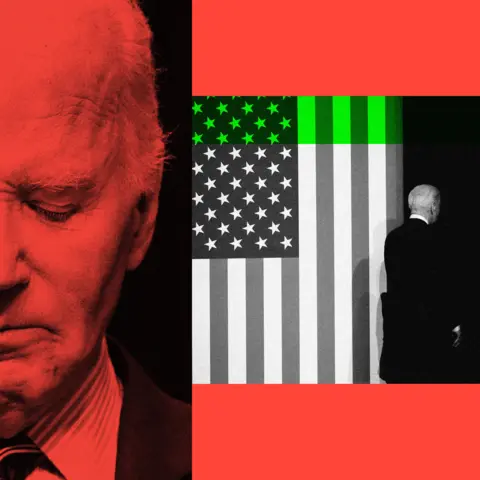 BBC
BBC
Standing at a lectern at Washington's National Cathedral last Thursday, Joe Biden delivered the eulogy for former President Jimmy Carter while three other former presidents – Bill Clinton, George W Bush and Barack Obama – and the once and future president, Donald Trump, looked on.
Each spectating president had achieved the validation of the American people (re-election to a second term) that has eluded Biden. And as Biden, whose term comes to an end next week, paid tribute to Carter, a fellow one-term president, it was hard not to draw other parallels too.
"Many think he was from a bygone era, but in reality, he saw well into the future," Biden said of Carter. He went on to note Carter's accomplishments in advancing civil rights, his work on peace and nuclear non-proliferation, and his efforts to protect the environment.
Earlier in the week, however, Biden was making the case for his own legacy and how history should judge him.

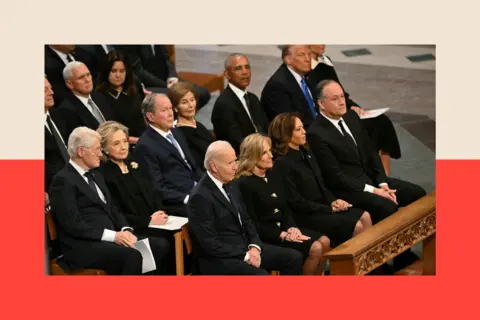 Getty Images
Getty Images
Biden (front row on the left) attended the State Funeral Service for former US President Jimmy Carter along with Kamala Harris, Hillary Clinton (both pictured) and several former US presidents
"I hope that history says that I came in and I had a plan how to restore the economy and reestablish America's leadership in the world," he said in a television interview. "And I hope it records that I did it with honesty and integrity; that I said what was on my mind."
Whether that happens is subject to vigorous discussion - but he exits the White House with his approval ratings near their lowest mark of his presidency. Only 39% have a positive view, according to the latest Gallup survey, down from 57% at the start of his term.
Next week, the man he defeated in 2020 returns to power, marking what must feel to him like a dour end to a presidency.
Biden had his accomplishments – adroitly shepherding complex investment and infrastructure legislation through Congress despite narrow majorities, strengthening and expanding Nato, and appointing a remarkable number of diverse judges to the federal bench – but at least for now, that is overshadowed.

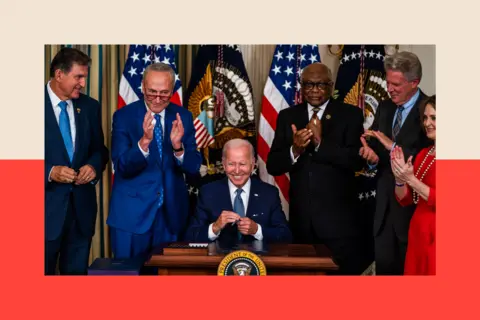 Getty Images
Getty Images
President Biden after signing into law the Inflation Reduction Act of 2022 in the White House
His current place in history is as the Democratic interregnum between the two Trump presidential terms. A blip, rather than a pivot.
"He'd like his legacy to be that he rescued us from Trump," says author and Democratic strategist Susan Estrich. "But sadly, for him, his legacy is Trump again. He is the bridge from Trump One to Trump Two."
It didn't have to be this way. Biden and his team were buffeted by events – some within his control and some outside it. Many of the most damaging developments were entirely predictable, however – and, in fact, predicted - yet the president and his administration appeared to be caught flat-footed.
For that, they paid a high price.
From Kabul chaos to early 'missteps'
Biden's first misstep as president came half a world away, in the chaos that unfolded during the US withdrawal from Afghanistan in August 2021.
The exit had been negotiated during the final months of the Trump administration, but Biden backed it – despite warnings from some of his military advisors.
Those dire predictions proved prophetic, as Kabul descended into panic and unrest.

 Getty Images
Getty Images
People climb atop a plane and try to find a way onboard at Kabul airport in August 2021
By the end of that month, Biden's Gallup approval rating had dipped below 50% for the first time – a mark it would never again reach.
On the domestic front, the situation for the president was equally inauspicious. By summer, US inflation had surpassed 5% for the first time in 30 years.
Treasury Secretary Janet Yellen said that she believed the spike was "transitory". Biden called it "temporary". Some outside the administration, most notably Obama's Treasury Secretary Larry Summers, thought otherwise.
By the time inflation reached its peak a year later, at 9.1% in June 2022, Yellen and Biden had admitted they miscalculated.
Americans did not forget or forgive, however. And although the monthly inflation numbers had dropped below 3% by summer 2024, unemployment remained low, economic growth was steady and the US had outperformed the world's other industrialised nations, voters continued to have a pessimistic view of the economy.
Other issues followed this pattern: The Biden administration was slow to respond to the post-covid spike in undocumented migration at the US-Mexico border.
And it was seemingly caught off-guard by the disruptive impact the Republican-backed programme of relocating migrants to Democratic-run northern cities would have on government services far from the border.
Shortages in covid tests and infant formula, a dramatic increase in the price of eggs, the end of Roe v Wade abortion protections, and the wars in Ukraine and Gaza – for every seemingly unanticipated fire the Biden administration addressed, two new ones would emerge.

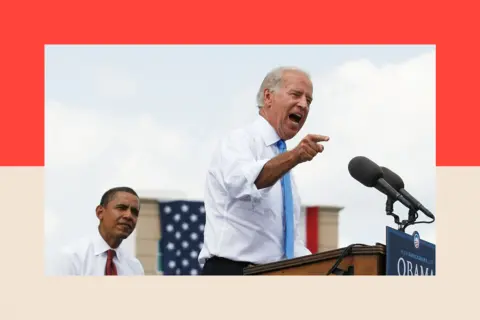 Getty Images
Getty Images
Previously he served as vice president under President Obama from 2009 to 2017. (Pictured here at the Old State Capitol in Springfield, Illinois, in 2008)
The challenges were, in fact, daunting – ones that felled incumbent leaders in democracies around the world.
But for Biden and the Democrats, hoping to prove that they were a competent and effective counterpoint not just to Trump but to global authoritarian regimes, the stakes were high.
'An elderly man with a poor memory'
Amid all of this, responses from the administration were sometimes glaringly off-key. When asked during a television interview about raising oil production in America to reduce gas prices, in November 2021, Energy Secretary Jennifer Granholm responded with a laugh.
"That is hilarious," she said. "Would that I had the magic wand."
Biden – once regarded as a gifted communicator and orator - appeared less able to connect with the American people. Signs of his advancing years were also showing.
"Watching Biden speak, I'm like, oh my God, this is a different person," said a senior White House official who served in the early years of the Biden administration and spoke on the condition of anonymity.
"Maybe it's simply that when you're there every day, you don't see it."

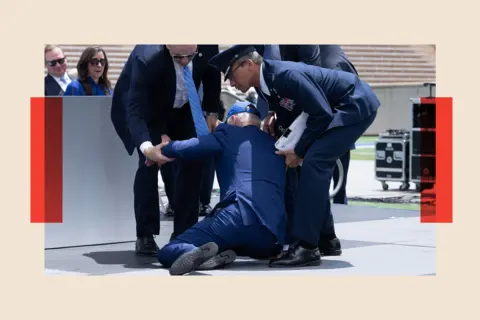 Getty Images
Getty Images
The president fell over while attending a graduation ceremony at the United States Air Force Academy
A report by Robert Hur, a special counsel appointed to investigate Biden's handling of classified documents, referred to the president as an "elderly man with a poor memory", setting off a round of hand-wringing among Democrats.
Biden's interactions with the media were curtailed, and his public appearances tightly scripted. His verbal miscues and stumbles became fodder for Republican attacks. But Biden pressed on, determined to seek and win a second term in office.
Biden's people: His inner circle
During his presidency, Biden surrounded himself with veterans of government service. His secretary of state, Antony Blinken, had been one of his top foreign policy advisors since his days in the Senate. Merrick Garland, a distinguished appellate court judge and Barack Obama's ill-fated 2016 pick for the Supreme Court, was tabbed for attorney general. Yellen, his pick for treasury, had previously chaired the Federal Reserve.
Within the White House, Biden chose Ron Klain – who had worked in Democratic presidential administrations for decades – as his chief of staff. Mike Donilon, another Biden veteran, served as a senior advisor.
The team was particularly successful at managing the narrow majorities in the House and the Senate, notching early legislative victories even in the face of unified Republican resistance and reluctance from centrists in his own party.

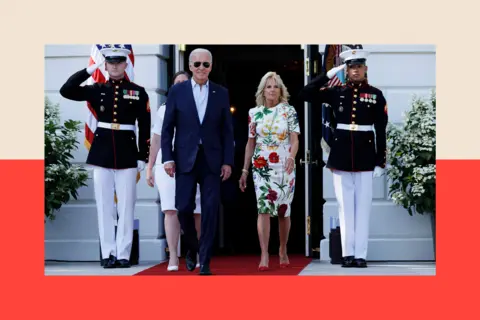
US President Joe Biden and First Lady Jill Biden during a Fourth of July event at the White House
Biden's "American Rescue Plan", which passed just two months after he took office, included nearly $2 trillion in new government spending. It expanded healthcare subsidies, and funded the distribution of Covid vaccines and a payment programme that cut child poverty in half, to 5%.
Later that year, Democrats and some Republicans joined to pass an infrastructure investment bill, which included $1tn in new spending on transportation, clean energy, water, broadband and other construction programmes.
Others followed, marking a legislative agenda that few first-term presidents in the modern era could match – but it came with what some critics see as a fatal flaw.

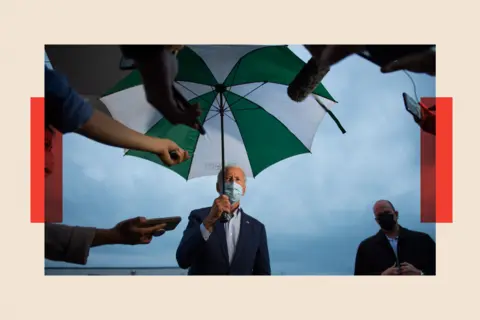 Getty Images
Getty Images
The circle around Biden became increasingly insular, according to claims
Brent Cebul, an associate professor of history at the University of Pennsylvania, argues that Biden's efforts were too focused on shifting policies that take years to translate into economic benefits for average American workers.
"I think that the time horizon associated with those big pieces of legislation was way out of sync with the exigencies of the presidential election," he said.
Biden would have been better served finding ways to bring the tangible benefits to voters more quickly – a sentiment Biden himself expressed during a recent newspaper interview.
'Infighting and frustration' from within
His team also proved less able when success was measured not in laws enacted but in the daily messaging battle against a political opposition that was growing increasingly assertive.
A senior Biden official said that the White House team was more decisive early on in his presidency.
"As things started to become a grind and you lose that sense of getting big things done, it can give way to infighting and frustration," they admitted, adding that it was their sense that the circle around Biden became more insular as the pressure built.

 Getty Images
Getty Images
Biden's presidency should be seen in two halves, says one commentator
After a two-year respite, his political opponents launched investigations, held hearings (into the Afghanistan withdrawal, the Biden family's business dealings and more) and, in September 2023, formally initiated a presidential impeachment inquiry. All the while, Biden's public approval languished in the low 40s.
Biden's presidency should be seen in two halves, says Mr Cebul. The first was more accomplished. The second was less focused.
"Biden's sense that the US was macro-economically doing quite well led him and his advisors to take their eyes off the ball when many, many Americans were still very much hurting."
A beleaguered election campaign
On 25 April, 2023, Biden made his presidential bid official in a campaign video warning that Trump "extremists" were threatening America.
Over the following months, there would be more warnings of the danger Trump posed to American democracy. He would tout his economic plan – embracing the label "Bidenomics" - and point to how inflation was dropping while the economy was still growing.
I travelled with Biden on a June 2023 trip to Chicago, where he held a reception for deep-pocketed donors and gave a speech on the economy in an historic downtown post office.
"Bidenomics is about the future," he said."Bidenomics is just another way of saying: Restore the American dream."
Mr Cebul believes that was a bad move.
"For him to then spend most of the spring and the early summer basically talking about how he's the most successful economic president in modern history, it was just so discordant," he said.
"Not only was the message out of sync, he was also just a terrible messenger."

 Getty Images
Getty Images
Donald Trump is set take the oath of office on 20 January
In Chicago, as in many of his speeches, Biden's delivery was at times halting. His words sometimes mumbled and his syntax mangled.
Through it all, however, Biden was telling aides that he believed he was the man best positioned to defeat Trump – that he had done it once, and he would do it again. And those aides vigorously pushed back whenever anyone questioned Biden's abilities.
"I'm not a young guy, that's no secret," Biden said in a campaign advert. "But here's the deal: I understand how to get things done for the American people."
Hamas, Hunter and final hurdles
In the autumn, Biden confronted yet another crisis - following the 7 October Hamas attack on Israel, he quickly cautioned Israel not to overreact or overreach in its response to the bloodshed.
As with the Russian invasion of Ukraine, the president turned his attention to world affairs. But unlike Ukraine, during which Biden assembled a unified western coalition against the invasion, the continued US support of Israel eroded enthusiasm and support for Biden in some quarters at home.

 Getty /Israeli GPO handout
Getty /Israeli GPO handout
Continued US support of Israel eroded enthusiasm and support for Biden in some quarters
At the same time, Biden was confronting his son Hunter's growing legal troubles – a June trial and conviction on gun charges and, perhaps more concerning for the president, an indictment on tax-related violations that involved Hunter's foreign business dealings.
The airing of family discord and pain was, at the very least, a distraction and an emotional drain on the president. His ultimate decision to pardon his son, made after November's election, was condemned by many, including some allies.
Ultimately, Biden's presidential bid – and his presidency – came crashing down in late June on a stage in Atlanta during a debate with Trump. His confused and at times incomprehensible performance dealt his campaign a mortal blow that seemingly confirmed Republican attacks – and Democratic fears – about his advancing age.
But eventually, after Trump defiantly responded to a failed assassination attempt and held a boisterous, unified national party convention in mid-July, Biden dropped out of the race.

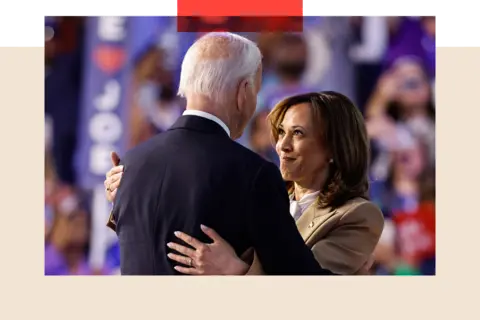 Getty Images
Getty Images
Biden and his team were buffeted by events, some within his control and some outside it
Trump's victory over Kamala Harris, Biden's hand-picked successor, ensured that the final electoral judgement on Biden's half-century political career would be one of rejection and defeat.
What would Biden's legacy have been if he had simply stepped aside – "passed the torch" in his words – without seeking a second term? No video campaign launch. No grasping for campaign messages or Trump debate disaster. Instead, a robust race for the Democratic nomination with Biden floating above it all.
"We should have had primaries," argues Ms Estrich. "His successor would have had time to make the case."

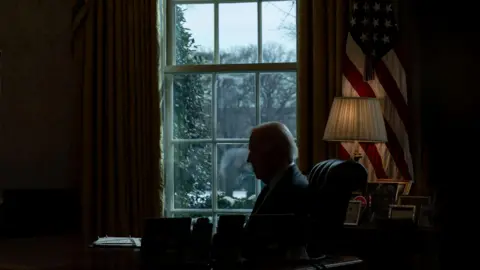 EPA
EPA
Nearing the end of an era: Biden in the Oval Office at the White House in January 2025
In the end, Biden's age and Trump's enduring appeal were the fires that his administration could never put out, and the ones that ultimately consumed his presidency.
In exactly one week, Trump will take the oath of office and will likely set about dismantling much of what Biden accomplished over the past four years. How effective he is at doing this will go a long way towards determining Biden's lasting legacy.
A few weeks ago, I asked Attorney General Garland how he thought history would judge Biden and this administration.
"I'll leave that to the historians," he replied.
That, in the end, is all Biden has left.
Top picture credit: Getty Images
BBC InDepth is the new home on the website and app for the best analysis and expertise from our top journalists. Under a distinctive new brand, we’ll bring you fresh perspectives that challenge assumptions, and deep reporting on the biggest issues to help you make sense of a complex world. And we’ll be showcasing thought-provoking content from across BBC Sounds and iPlayer too. We’re starting small but thinking big, and we want to know what you think - you can send us your feedback by clicking on the button below.

 3 days ago
6
3 days ago
6








 English (US) ·
English (US) ·